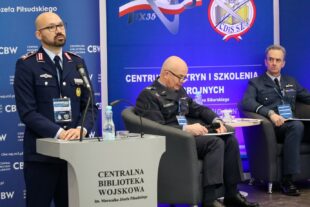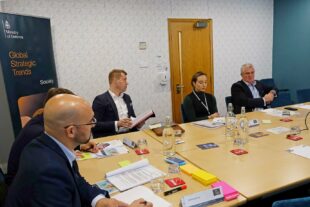Lieutenant Colonel Markus P., a German Air Force Officer at DCDC shares his thoughts on Global Strategic Trends and the important role of Strategic Command.

Interviewer: Could you provide us with an introduction to your role and background?
Lieutenant Colonel (GS) Markus P.: I am Lieutenant Colonel (General Staff (GS)) Markus P., an officer with the German Air Force, and I have been serving as an exchange officer in the Futures Team at the Development, Concepts and Doctrine Centre (DCDC) since October 2021. Additionally, I act as the point of contact for the UK Defence Academy to the Bundeswehr, Armed Forces of the Federal Republic of Germany. My primary focus remains on supporting strategic and foresight analysis activities, including the Global Strategic Trends (GST) project.
Interviewer: What is the GST project?
Lieutenant Colonel (GS) Markus P.: GST 7 endeavours to visualise the drivers shaping the future until 2055. The project's significance lies not merely in individual facts but in presenting a condensed repository of knowledge and insights. GST covers a broad spectrum of economic, environmental, and social issues on a global and regional scale, fostering the imagination of multiple future scenarios to mitigate strategic surprises.
Interviewer: How did the opportunity to work at DCDC materialise, and what are your responsibilities there?
Lieutenant Colonel (GS) Markus P.: After completing the German General and Admiral Staff Course in Hamburg, a program akin to the UK Advanced Command and Staff Course, I was approached regarding the prospect of joining DCDC. Given my prior experience in the UK from 2014 to 2017 and the intriguing nature of the job description, the decision was straightforward. My responsibilities encompass a spectrum of tasks, ranging from comprehensive literature reviews and data collection to the ongoing consolidation of analysis. As the publication date for the seventh edition of Global Strategic Trends approaches, our focus has shifted towards effectively communicating GST through multimedia and augmented reality.
Interviewer: How does DCDC, particularly the Futures work, contribute to Defence?
Lieutenant Colonel (GS) Markus P.: The GST series, which is led by the Futures Team, has played a pivotal role in supporting high-level decision-making for over two decades. Authored by a mixed team of military, civilians and embedded exchange staff from partner nations, it offers a global perspective that informs strategic decisions, provides context for developing UK Defence strategies, and facilitates long-term thinking.
Interviewer: How does your experience in Strategic Command compare to previous roles?
Lieutenant Colonel (GS) Markus P.: The transition to Strategic Command represents a substantial shift, where my focus has expanded from weeks or months to decades. It’s almost incomparable to my previous roles. Although it may seem distant from the core military mission, this approach enables a broader, anticipatory understanding of the strategic landscape.

Interviewer: What has been the highlight of your time at Strategic Command?
Lieutenant Colonel (GS) Markus P.: The most noteworthy aspect of my two years with DCDC has been the diverse perspective offered by a team of talented and intellectual professionals. Beyond their qualifications, the international composition of the team provides a wealth of insights, particularly valuable to overcome national biases for strategic projects and trends on a global scale.

Interviewer: How would you characterise Strategic Command?
Lieutenant Colonel (GS) Markus P.: Strategic Command is like the central hub that brings together various essential abilities. Without these capabilities, the effectiveness of other military branches wouldn't be as good. It helps make everything run smoothly, from long-term planning to everyday operations.
Interviewer: Any concluding thoughts?
Lieutenant Colonel (GS) Markus P.: I would like to underscore that the creation of Global Strategic Trends is a collaborative effort, involving the entirety of DCDC. While the Futures Team is at the project's core, valuable contributions come from colleagues across the board. The publication's intentional accessibility to the public is designed to stimulate broader conversations and serve as a launchpad for additional projects, emphasising that the strategic journey continues beyond the publication's release.
Leave a comment